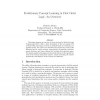Free Online Productivity Tools
i2Speak
i2Symbol
i2OCR
iTex2Img
iWeb2Print
iWeb2Shot
i2Type
iPdf2Split
iPdf2Merge
i2Bopomofo
i2Arabic
i2Style
i2Image
i2PDF
iLatex2Rtf
Sci2ools
123
click to vote
AICOM
2006
2006
Evolutionary concept learning in First Order Logic: An overview
This paper presents an overview of recent systems for Inductive Logic Programming (ILP). After a short description of the two popular ILP systems FOIL and Progol, we focus on methods based on evolutionary algorithms (EAs). Six systems are described and compared by means of the following aspects: search strategy, representation, hypothesis evaluation, search operators and biases adopted for limiting the hypothesis space. We discuss possible advantages and drawbacks related to the specific features of the systems along these aspects. Issues concerning the relative performance and efficiency of the systems are addressed.
Related Content
| Added | 10 Dec 2010 |
| Updated | 10 Dec 2010 |
| Type | Journal |
| Year | 2006 |
| Where | AICOM |
| Authors | Federico Divina |
Comments (0)

